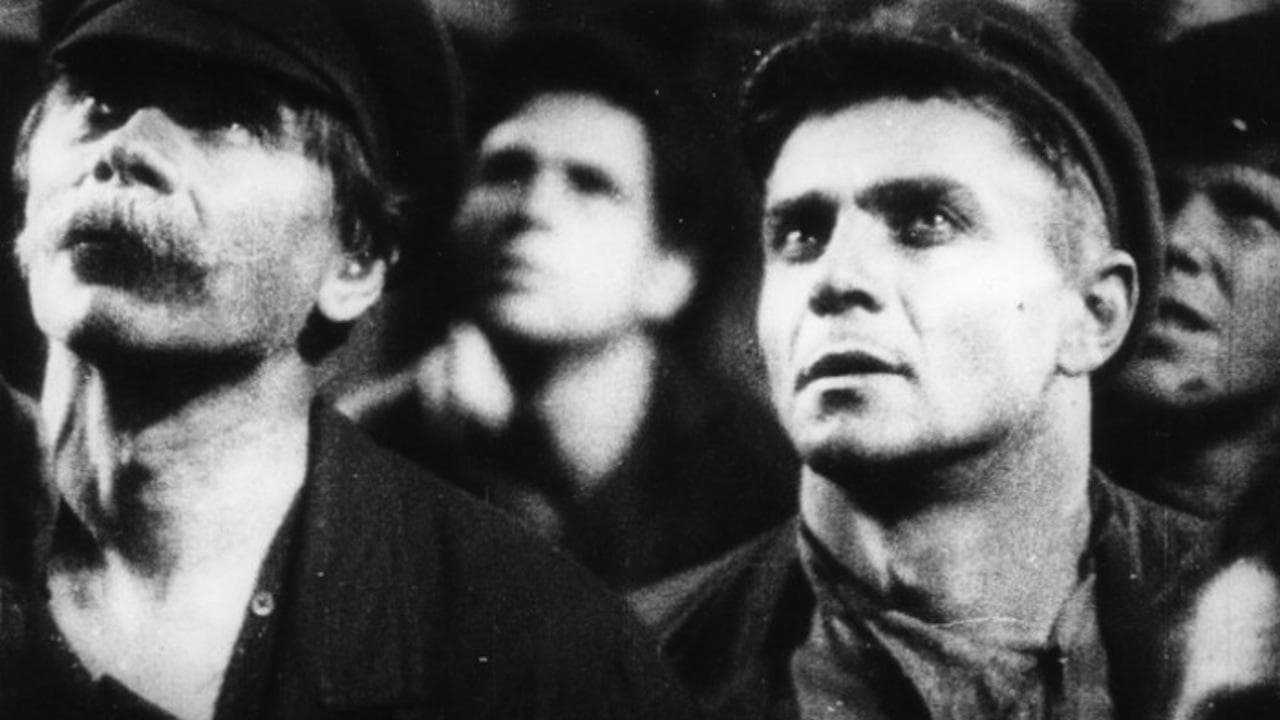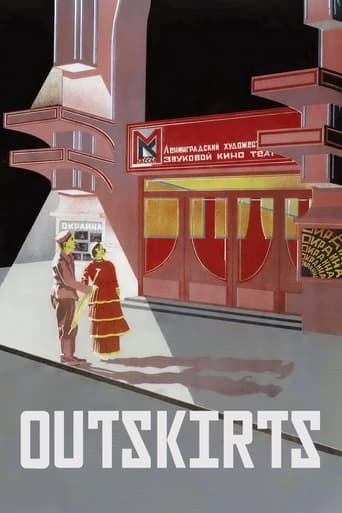Jeanskynebu
the audience applauded
StunnaKrypto
Self-important, over-dramatic, uninspired.
Smartorhypo
Highly Overrated But Still Good
Tedfoldol
everything you have heard about this movie is true.
mflynn-69970
"The Outskirts (Okraina)" follows several stories as villagers in a far-distant Russian town are faced with war, a strike, a prisoner-of-war camp, and the effects and aftershocks these all bring. The town the film begins in is struggling with the shocks and effects of war, and the film follows those effects in multiple story lines. The ways that the war is used vary, from a factory strike brought on by the harshness of the times, to a young woman and her budding relationship with a German prisoner of war, to the shoe factory strike, to the soldiers at the front lines. As with many other Soviet films, there are many semi-leading and leading characters, and these film is constantly shifting between groups of characters and stories we are following. There are also tertiary characters being effected by the war as well. The transition from the more comedic parts to the horrors of war are quick, and often very abrupt. The clumsiness of the story comes from the odd pacing, with too-long bouts of time spent in the various places where the film takes place, making it difficult to transition back to the other story lines easily. The film is clearly struggling to fit the appropriate criteria laid forth by the Soviet Union, to tell the right story with the appropriate characters and the right messages. The stories we follow are compelling in and of themselves but the choppy pacing and the lack of technical finesse detract from the overall quality of this complex, multi-layered war film.
hte-trasme
There are a lot of things at work in this film. They're not all necessarily working together, but they're at work. This is often a serious war film, but we still have horses talking and characters winking broadly at the camera for comic effect when need be. Under the umbrella of telling us about of small Russian town (on the "outskirts") during a vital point in history, we end up with a story about a small shoe-factory that may or may not go on strike, one about a German tenant in Russia and his landlord, one about German prisoners of war held in the town and their search for work, and one about a potential romance between one of the soldiers and the landlord's daughter -- and that's before we jump ahead to 1917 for the last twenty minutes. Some of these subplots intertwine in interesting way, but they all cannot. It's filmed with a very striking visual style and filled with memorable images (even occasionally using a visual pun for a scene change), but it still has the early-sound characteristic of moving fairly slowly. That wouldn't be a problem due to the interesting visuals, except that it magnifies the scattered nature of the stories. At its heart, the conflict of the landlord who is caught between affection for his tenant and nationalism turning him against Germans, and later must deal with this again when he catches his daughter with the German prisoner, is a touching one. It also allows for several conflicted and three-dimensional characters in the midst of things. Jumping ahead to the revolution feels out of place and disjointed to this viewer, but perhaps that was mitigated at the time by the fact that for the intended audience of this film, this was a war at home that was well within living memory, and it would have been very directly relevant to them. In all, the film is imposingly made, but doesn't come off all the way due to the fact that its matter is too scattered to make up one story, but not as broad-lens at it would have to be if it wanted completely to be "the story of a town." But it's well worth a watch, both for historical interest and for its commendable camera and direction work.
kril10
Boris Barnet's 1933 film Outskirts was created during a time when the only films acceptable for public Soviet cinemas had to obey the motto: "films for the millions." If it was not simplemindedly portraying Communism, the Revolution, or the Party's role in improving Soviet life, it was not screened. Every viewer had to be able to understand their message about these themes. Although Outskirts did indeed depict Soviet class struggle, its relationship with World War I, and the Revolution, it did so in a way that very few contemporary moviegoers could fully understand. I say this because even I, a modern viewer with much more cinema-watching experience than the common Soviet citizens of the 1930s, had trouble following the film. Its many subplots were allowed to run their respective courses with little to no connection at all, and some of these subplots were not even adequately concluded. As a result, Outskirts provides little more than a series of incomplete stories with confusing messages at the end.To get right into it, the purpose of the German tenant at the Russian hotel is unclear—other than to perhaps depict bourgeois indulgence through whimsical games of checkers, why is he even in the film? All he does is play checkers, get angry at the bourgeois Russian owner at the outset of World War I, and leave without any further explanation. Furthermore, although the role of the captured German soldier is more understandable in the film's goal in representing Communist ideology, it was not concluded clearly at all. When the Russian shoemaker protected the German soldier as being "a fellow shoemaker" against the wounded Red Army soldiers, he made a point about the fact that Proletarian struggles transcend national borders, but what happened to the German soldier afterwards? Was he a convinced Communist? Did he fight again in the war? Outskirts failed to answer any of this.While all of this is going on, there are even more subplots—the relationship between the Russian shoemaker and his superior shoe factory owner with a large government order of boots, his two sons who fought and died in the war, an emerging love story between the Russian hotel owner's daughter and the captured German soldier, and a final sequence where the shoemaker may have murdered the hotel owner during the Revolution. There is a point where as a viewer, I have to say enough is enough. Although most of these do in fact represent Communist themes, I feel that Outskirts was a desperate attempt to compress the entire Party's ideology into one movie. In my opinion, the film's grand scope is what led to its confusing message and consequent failure.
leoperu
It's difficult for me to judge Rivette's statement about Boris Barnet having been the greatest of Soviet filmmakers after Eisenstein ; I definitely prefer his works to Eisenstein's or let's say Pudovkin's.Even in our postmodern days, Barnet's hybrid of social realism, satire, romance, genre movie, musical and slapstick may be called eccentric. Rich, dynamic mise en scene is quintessential of this masterpiece condemnation of militarism, nationalism (and capitalism). It consists of two distinct parts, the first, pre-war one mixing realism with bizarre humour, the second delivering images of war rare in their docu-like naturalism far from Eisensteinian pathos.The transfer on Mr. Bongo's recent release seems quite good ; regrettably no extras were taken from the original Ruscico version./To any reader of this interested in Barnet I would like to recommend another gem by this filmmaker - funny, charming and moving "Dom na Trubnoy" ("The House on Trubnaya Street"). It was recently released in France, with Russian intertitles and French subs (the movie is a silent one)./

